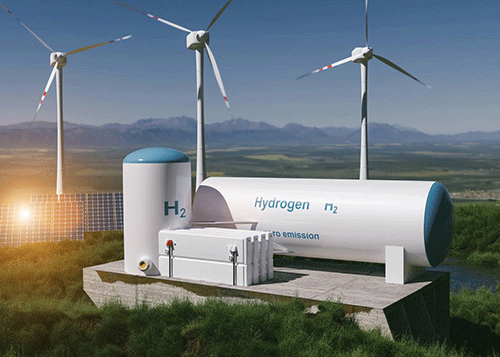Namibia is en route to achieving large-scale, low-cost renewable energy development, designing models for sustainably maximising fiscal revenue and local development in renewable energy investments as well as green ammonia production.
New Era had interviews with green hydrogen commissioner James Mnyupe and Green Hydrogen Council chairperson Obeth Kandjoze in efforts to bridge the gap between the public and the high panel on explaining this new ambition and engine of economic growth.
Laying the foundation, green hydrogen (GH) is defined as hydrogen produced by splitting water into hydrogen and oxygen using renewable electricity through electrolysis.
Once produced, hydrogen can be used directly as a fuel (with some modifications to respective engines/machines), or it can be converted to ammonia and the ammonia used as fuel.
“With a flame of pure hydrogen burning in air, the hydrogen (H2) reacts with oxygen (O2) to form water (H2O) with the release of energy. In atmospheric air rather than pure oxygen, hydrogen combustion may yield a small amount of nitrogen oxides with the water vapour. The energy released allows hydrogen to be used as fuel,” explained Mnyupe.
When asked on environmental conditions, Mnyupe stated prior to the development of any GH facilities, a full environmental impact assessment (EIA) is required.
He said the EIA will interrogate the impact of hydrogen projects in relation to the flora and fauna, the generation, storage and transportation of hydrogen and its derivatives.
Noteworthy, when used hydrogen’s only by-product is water and it can store or deliver a large amount of energy. At lower concentrations, he added hydrogen has a similar flammability potential as other fuels. This is aided by the fact that hydrogen is so light that it quickly disperses into the atmosphere once released into the air, preventing it from igniting.
According to Bloomberg NEF 2022 Outlook, hydrogen fuelled sales are set to continue rising sharply in the years ahead as policy pressure continues to increase, more models hit the market and consumer interest takes off.
“We are already seeing hydrogen fuelled vehicles operating in certain parts of the world and can expect to see this application increasing as the hydrogen production markets increase. As with all new technologies, costs are relatively high at inception stage and reduce over time. It can be expected that this scenario would be applicable to hydrogen-fuelled vehicles,” stated Mnyupe.
The Hyphen project with an estimated investment of US$9.4 billion, which will be entirely financed by Hyphen is expected to produce about 300 000 tonnes of green hydrogen for regional and global markets. Mnyupe said Hyphen will also produce excess desalinated water and electricity. He added the final split between local consumption and export is currently part of the ongoing negotiations with government that will be concluded and communicated by November 2022.
Hyphen is owned by two companies namely Nicholas Holdings and Enertrag. Nicholas Holdings is an investment and project development company with extensive experience in the development, operation, commercial structuring and financing of green and brownfields infrastructure projects in the power generation, port, rail and logistics infrastructure sectors across Africa.
Enertrag is a renewable energy company with deep knowledge, expertise and experience in hydrogen and renewable energy projects, with operations in Africa and globally.
According to Kandjoze, the water used to produce hydrogen will be desalinated water from the ocean: “The water that is used in the electrolysis process needs to be clean and pure to ensure that no sediments are deposited in the electrolyser. To ensure this happens, when sea water is used, it needs to be desalinated and purified.” In ensuring that Namibia’s hydrogen resources are not depleted and the environment is protected, Kandjoze stated government is currently working on identifying applicable regulations required to govern the hydrogen industry in Namibia and assessing regulations being used in other areas of the world.
In Namibia’s case, the hydrogen resources consist of solar, wind and seawater, which are currently in abundance and envisaged to continue for the forthcoming future.
“The purpose of producing green hydrogen is fundamentally based on reducing carbon emissions produced from burning fossil fuels in order to protect the global environment. Environmental protection is at the very heart of green hydrogen and will be a driving consideration across the full spectrum of each green hydrogen project,” explained the chairman.
Following the review and lessons learnt, assessment from the first Harambee Prosperity Plan and National Development Plans, government acknowledges the critical role that execution, monitoring and evaluation and reporting plays in improving the delivery of public goods and services.
In making sure the industry thrive, government has bolstered its capacity by establishing a performance delivery unit to support and capacitate the local government on project management.
Kandjoze stated government contracted various specialists to support the development of this industry. He noted private developers will prepare the feasibility and business case of the project, raise the funding, build the project, and operate it for a defined period. Government’s responsibility would be establishing a conducive environment for the industry.
Furthermore, government has plans to develop a synthetics fuels Act that will regulate the industry. Through the Namibia Standards Institute (NSI), Namibia will develop local standards for hydrogen and its derivatives. Hydrogen developers and operators will be required to comply with the requisite legislation, standards and regulations.
Kandjoze added government is however exploring possibilities of acquiring some shareholding in the Hyphen and subsequent projects given the economic benefits and opportunities this will have for Namibia.


